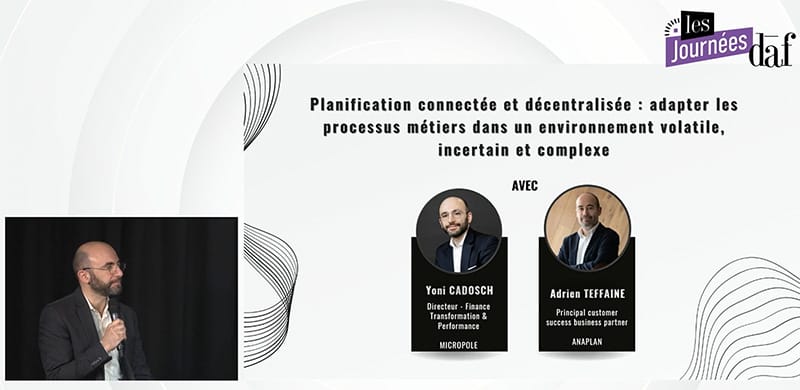By Aurélien Gour, Data and Digital Partner, Micropole Group.

Many people are unaware that the key to success in many digital transformation projects is data management. Today, different businesses invest large sums of money expecting concrete results as soon as possible, rather than putting data under control through appropriate governance. It is clear that many projects that are already well advanced are confronted with data quality issues and difficulties in identifying the key people (those responsible for this data and able to validate that this information is reliable and usable). The overall observation is that the lack of control over this data impacts not only IT, which is exhausted trying to interpret and rectify it, but also the business, which sees these projects slip, or the expected qualitative objectives become distant. So what are the keys to ensuring data control and therefore the success of a digital transformation project?
First of all, let's go over the various pitfalls frequently observed during this type of project, with the example of the implementation of Hadoop platforms:
- The lack of traceability of the sources of information injected into a Data Lake.
- The lack of clarification of the governance to be put in place around the Data Lake. This point is often treated too late. In any case, it is necessary to define the stakeholders and processes to be put in place to enrich, manipulate and access the data in the Data Lake.
- The rush to deliver MVP (Minimum Viable Product): companies want to see products quickly in order to launch their industrialization. However, the problems linked to the reliability, knowledge and traceability of data mean that the transition from POC mode to industrialization is often problematic.
So how do we deal with these pitfalls?
1 - CONSIDER THE BENEFITS OF GOVERNANCE FROM THE BEGINNING OF THE PROJECT
Faced with the difficulty of mastering the sources of data available to customers, the problem often arises of identifying one or more people responsible for data in the company. Hence the need to ask the right questions upstream:
- How to identify these people?
- How can we make the right people aware of the importance of data governance so that they understand it and instill it in their teams?
- And finally, what strategy should be implemented in terms of governance to benefit projects, such as the Data Lake, for example?
Indeed, in a Data Lake environment, a lot of information and raw data (texts, videos, images, Excel) are stored. But if this "big" storage reservoir is at the heart of the project, only a data governance will effectively allow to :
- Accelerate all digital initiatives: all digital projects want data close to production to move from "prototype" mode to "industrialization" easily and as quickly as possible, in order to make new products available. The objective of data governance is to guarantee that the data is reliable, comes from the right sources, and is easily interpreted and understood by the project and business teams.
- Master the knowledge around data: to share a common language on data, a base of knowledge and know-how (MOE, MOA), then to be able to characterize the service commitments with respect to the data and the various actors. This type of project also allows to control the propagation of data, from its constitution (collection, calculation) to its use (traceability).
- Manage the risks related to data subject to regulation: the objective here is to ensure that the uses of the data comply with the company's obligations (personal data, regulatory reporting, etc.). Hence the need to qualify the level of sensitivity of the data, to classify it and to define the requirements in terms of security.
- Managing data quality and using the right tools: the challenge is twofold: first, you need to identify the people who are capable of defining all the quality rules that make it possible to establish the reliability of the data; then you need to identify where in the information system it is most relevant to implement tools that make it possible to monitor and industrialize governance. This makes it possible to guarantee the coherence, relevance and reliability of the data, and to evaluate and manage its quality. Managing data is definitely a guarantee of quality, relevance and consistency within the information system.
By covering all of these benefits, all the means will have been put in place to successfully carry out the digital transformation project. And this will benefit all IS stakeholders.
2 -GOOD PRACTICES TO MAKE GOVERNANCE LIVE
Another observation in the digital transformation is that, obviously, data governance is all too often confused with project governance. This is a mistake that should be avoided, because data governance concerns all of the company's data, well beyond the projects that use this data.
Furthermore, it is common that when a data governance committee is set up, companies only consider data through the lens of whatever projects they are working on. These committees thus set up operational and strategic objectives, whereas the main goal of governance is to make data reliable wherever it is. Governance cannot be reduced to a strictly "project" vision. If, on the other hand, the company wants to become Data Centric, then data governance must be clearly placed at the center of the company's strategy and teams must be motivated to learn how to have a transverse vision of their data.
Finally, for the proper implementation of this strategy, don't forget about change management! It is important to first identify the few stakeholders who will trigger this data governance and whose objective will be to instill a change of mindset within the organization. When a company wants to move from a product-centric or customer-centric strategy to a data-centric strategy, the paradigm shift implies a real change in mindset. To conclude, digital transformation means new offers, better knowledge of data and changes in mentality. To guarantee the success of projects, data governance must now be an integral part of the company's strategy.
















